Ben Wallace explains secret to 2004 Detroit Pistons, wishes Larry Brown never left
https://eu.freep.com/story/sports/nba/pistons/2021/03/18/ben-wallace-detroit-pistons-nba/6940151002/
Bill Dow | Special to Detroit Free Press
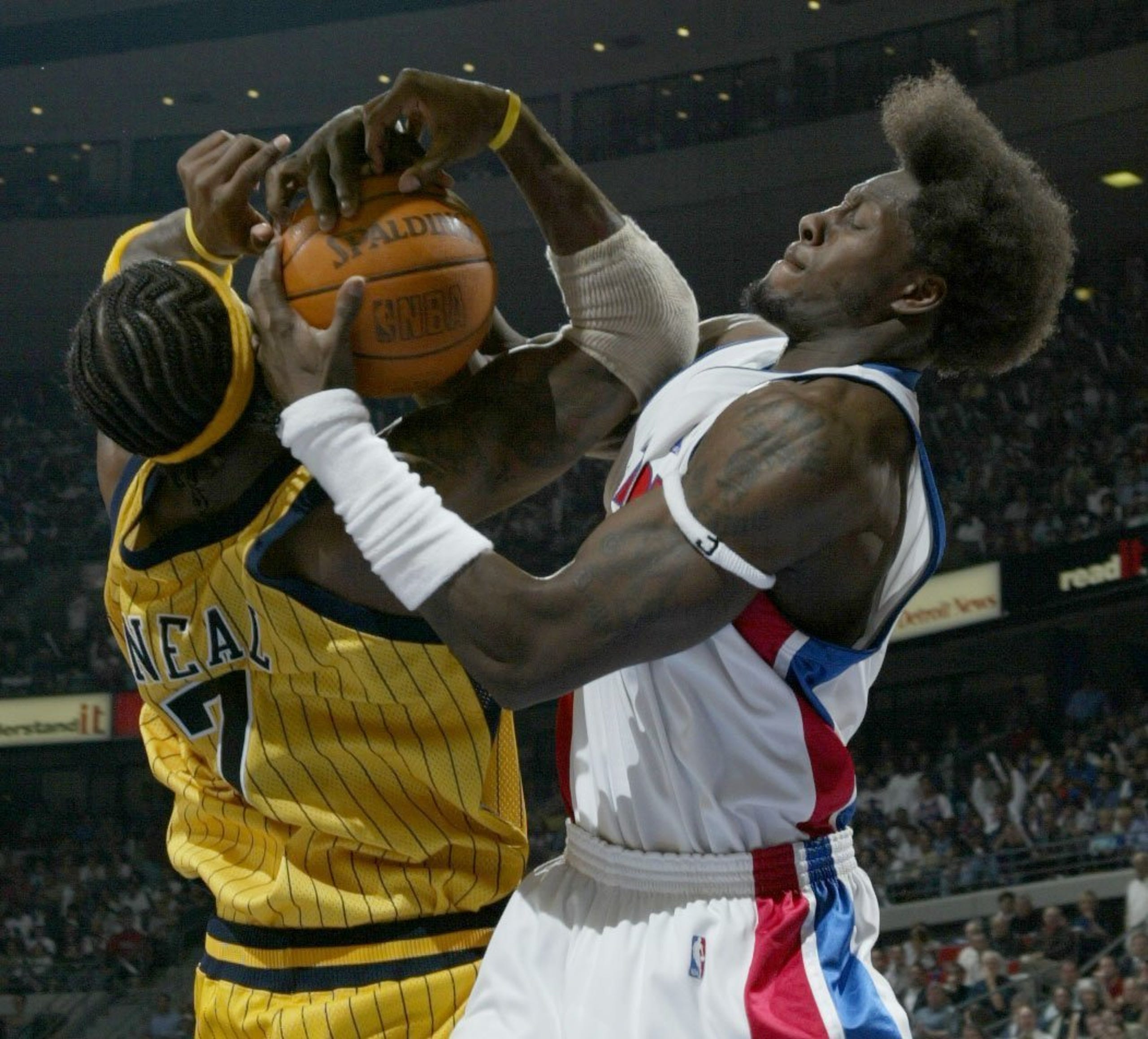

Discovered by Charles Oakley
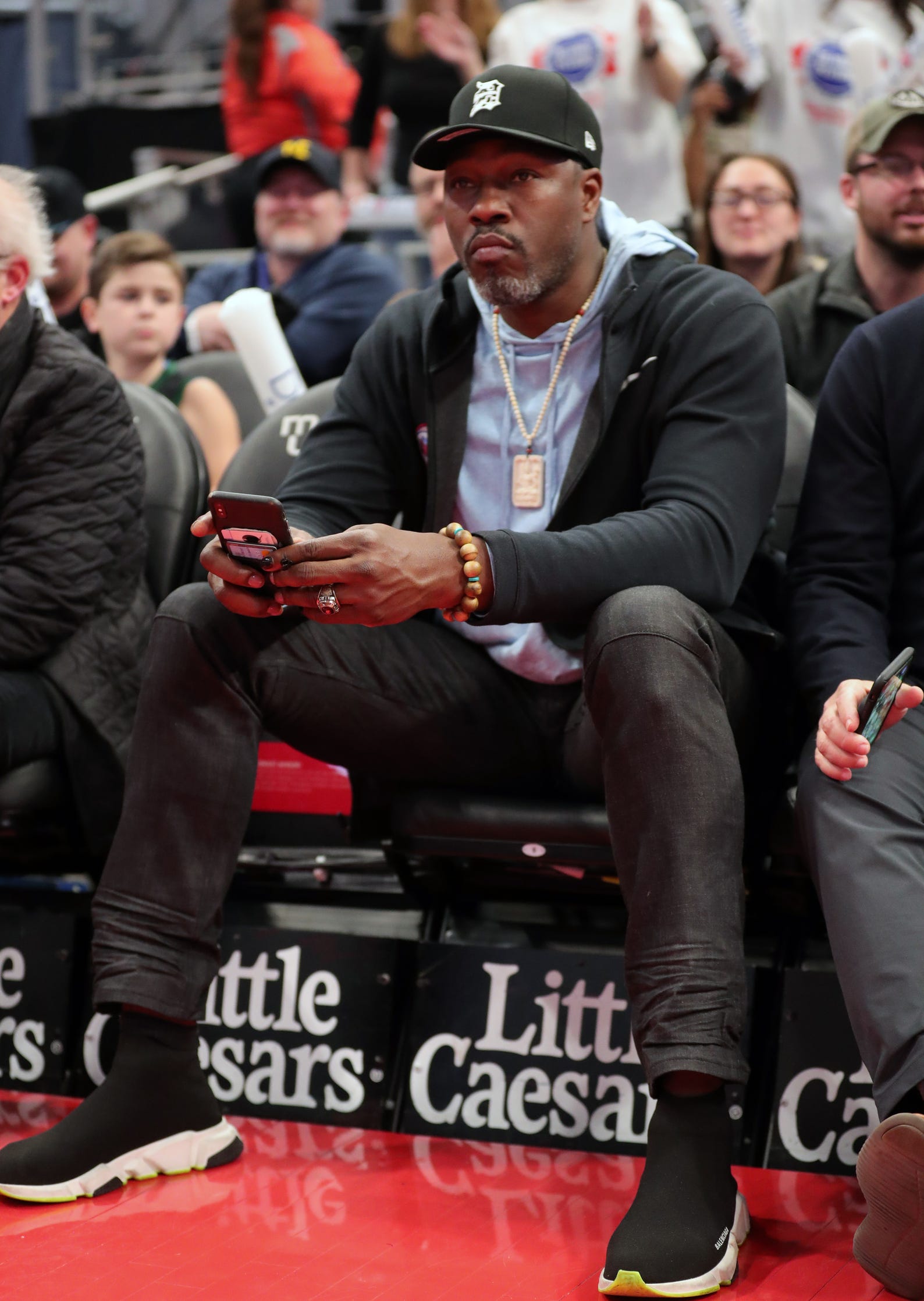

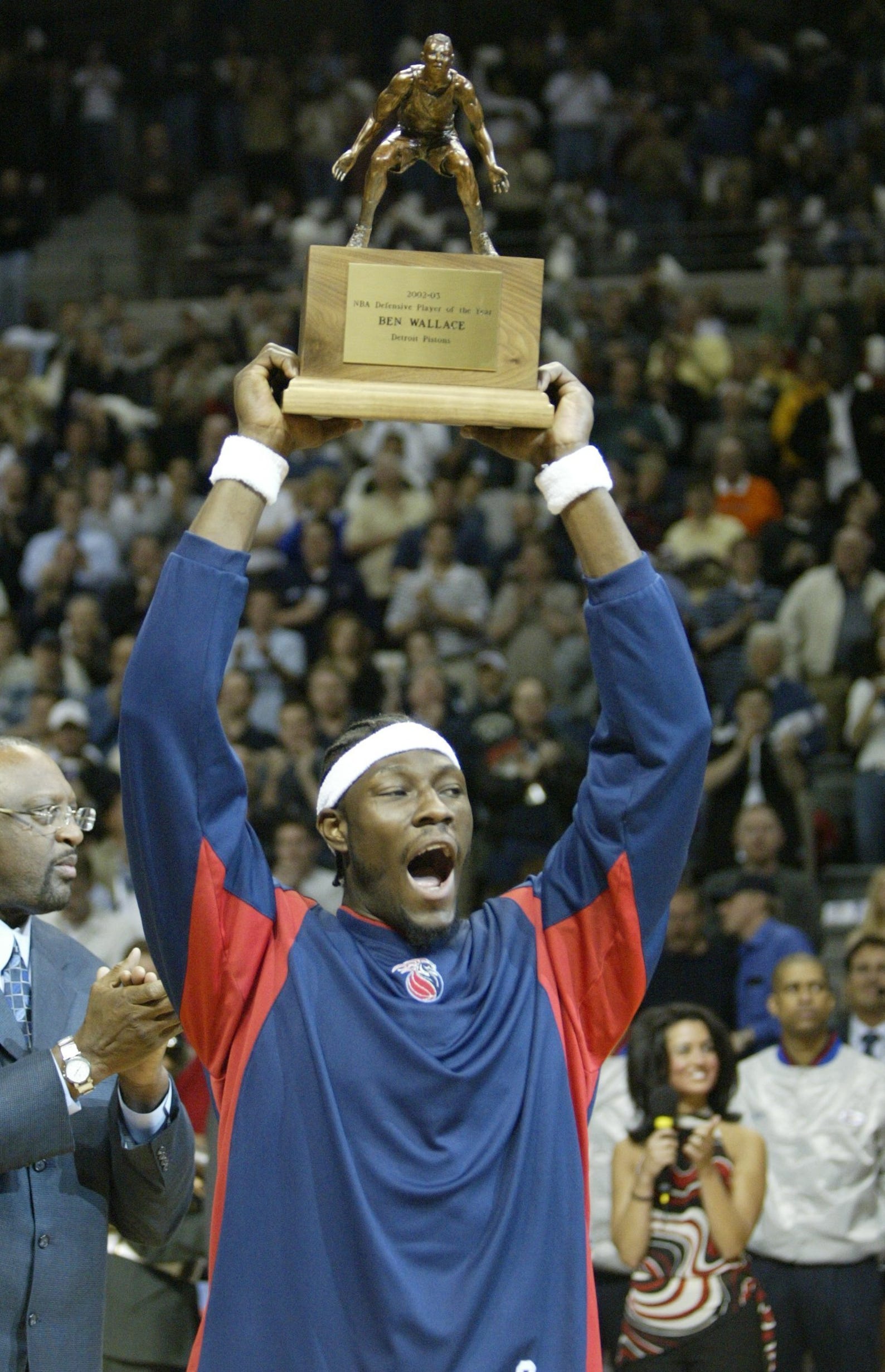
Success in rebounding and blocking shots
View |77 Photos
2004 NBA Finals best photos: Detroit Pistons 4, Los Angeles Lakers 1
Best photos from the 2004 NBA Finals, when the Detroit Pistons toppled the favored Los Angeles Lakers
[ Pistons flat-out better than Lakers in 2004. They proved it in Game 1 of Finals ]
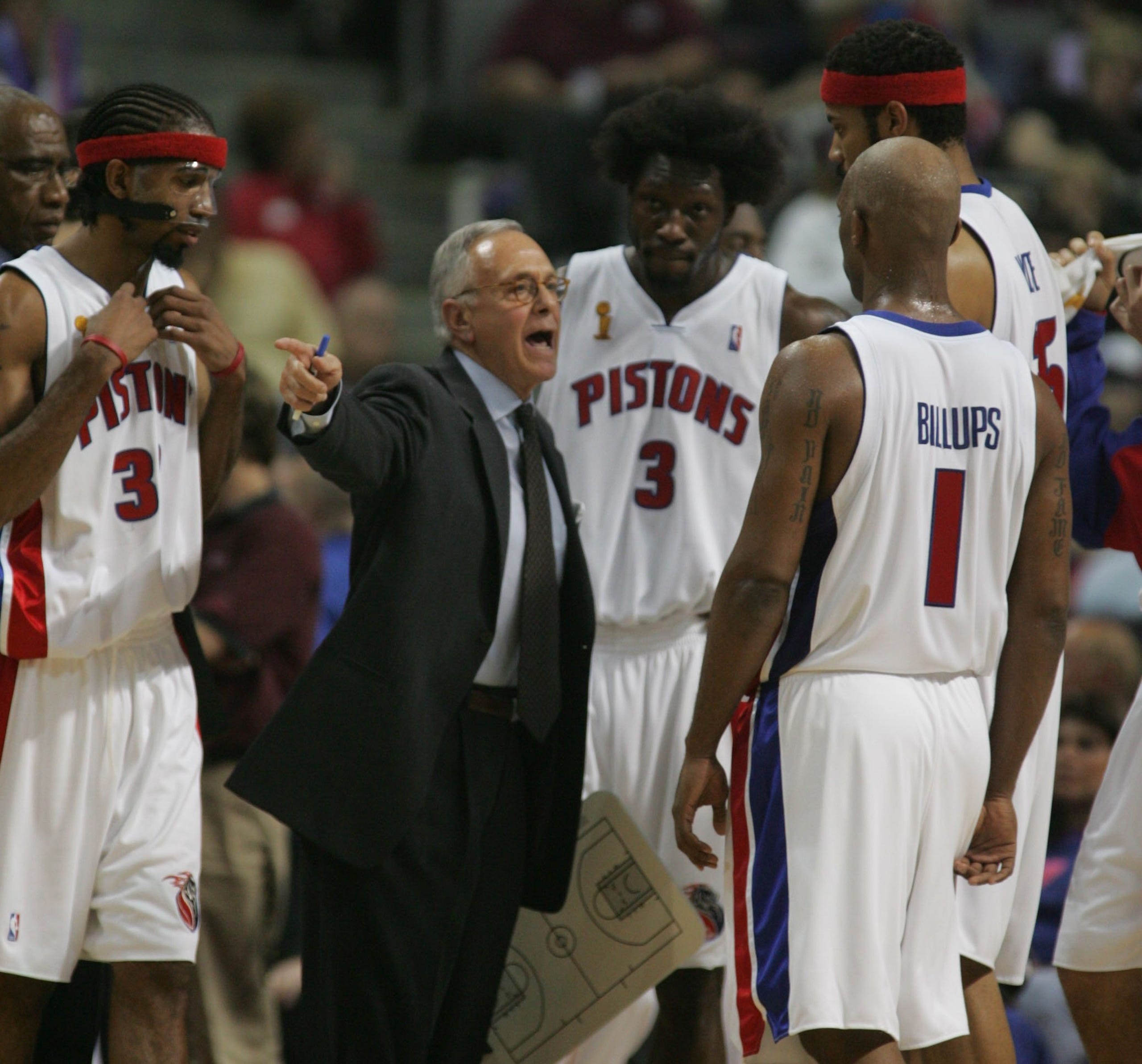

Playing for Flip Saunders, leaving the Pistons

View |27 Photos
Free Press headlines chronicle Detroit Pistons 2004 NBA title run
Detroit Pistons 2004 NBA championship chronicled by Detroit Free Press headlines
Bill Dow | Special to Detroit Free Press
As part of his series on former Detroit sports figures, Bill Dow caught up with Detroit Pistons legend Ben Wallace, who 20 years ago arrived in Detroit to become one of the game’s most dominant defensive players and a fan favorite.
Last week, the Naismith Memorial Basketball Hall of Fame announced Wallace is one of 14 finalists for the 2021 induction. The Class will be announced May 16. It is the third time he has been a finalist.
How we remember him
During the second golden age of the Pistons in the mid-2000s, the undersized center at 6 feet 9 and 240 pounds of solid muscle became one of the greatest defensive players in NBA history, as he helped the Pistons crush the heavily favored Lakers — led by Shaquille O’Neal and Kobe Bryant — four games to one to win the 2004 NBA championship. Although he was not a high-scoring player, in the clinching game, Wallace outplayed O'Neal with 18 points and 22 rebounds to O’Neal’s 20 points and eight rebounds.

Pistons' Ben Wallace ties up Indiana Pacers' Jermaine O'Neal for a jump ball during the third quarter in Game 6 of the Eastern Conference…
JULIAN H. GONZALEZ, DETROIT FREE PRESS
As the 10th of 11 children raised in Alabama, he was discovered by NBA great Charles Oakley, who became his mentor, at a high school summer basketball camp. Wallace played two years at Cuyahoga Community College in Cleveland, before transferring to Virginia Union University.
One of the NBA’s greatest undrafted players was first cut by Boston after a tryout and signed as a free agent with Washington in 1996, following a one-month stint playing in Italy. After three seasons with the Bullets/Wizards, he played one year in Orlando before being traded in August of 2000 with Chucky Atkins to the Pistons for Grant Hill.
As the first player in franchise history to lead the Pistons in rebounds, blocked shots, and steals in his first year in Detroit, Big Ben quickly became a fan favorite while often sporting a huge Afro haircut that led to the production of “Fear the Fro” T-shirts.

Ben Wallace embraces his wife, Chanda, before his No. 3 jersey rose to the Palace rafters Jan. 16, 2016.
KIMBERLY P. MITCHELL DFP
The following season, he earned the first of a record four NBA Defensive Player of the Year Awards (tied with Dikembe Mutombo) when he became the third player in history to lead the league in both rebounds and steals. The four time All Star (2003-06), five-time All-NBA member (three second-teams, two third-teams) and five-time NBA All-Defensive first team member (2002-06) signed as a free agent with Chicago following the 2006 season, where he played for two years before being traded to Cleveland. After two seasons with the Cavaliers, he signed with Detroit in 2009, where he played three more years before retiring. The Pistons retired his No. 3 in 2016.
In 2016, he was inducted into the Michigan Sports Hall of Fame, and on May 8, will be inducted into the Alabama Sports Hall of Fame.
Today
Wallace, 46, owns Wallace Motorsports, a U.S. based distributor of remote-control model racing cars which he also races, and is a part owner of the Grand Rapids Drive of the G League. He lives in Metro Detroit with his wife, Chanda, sons, Ben Jr. and Bryce, and daughter Bailey.
Wallace, 46, owns Wallace Motorsports, a U.S. based distributor of remote-control model racing cars which he also races, and is a part owner of the Grand Rapids Drive of the G League. He lives in Metro Detroit with his wife, Chanda, sons, Ben Jr. and Bryce, and daughter Bailey.
Discovered by Charles Oakley

Ben Wallace sits courtside for a Pistons game against Oklahoma City on March 4, 2020 at Little Caesars Arena.
KIRTHMON F. DOZIER, DETROIT FREE PRESS
“I was more passionate about football but I pinched a nerve in my neck in the beginning of my senior year, so I refocused my energy in basketball. One of my brothers signed me up at Charles Oakley’s local summer basketball camp. After lunch one day, I was kind of goofing around and not paying attention. Charles said, ‘Y’all know everything about basketball why don’t one of you play me one on one?’ Somehow, I got volunteered. I always thought basketball was kind of soft, but he showed me what a real man can do and he was not holding back. He was having his way and split my lip. Now I’m a player too and I don’t back down to nobody, so I didn’t mind getting physical with him. After that, he took a liking to me. He became my mentor and helped direct me to the two colleges I played for.”
Traded to Pistons with Chucky Atkins for Grant Hill

Pistons' Ben Wallace goes airborne while guarding Orlando Magic's Mike Miller in a preseason game Oct. 13, 2000, in Tampa, Fla.
ASSOCIATED PRESS
“I knew it was a stunning trade for Piston fans to lose Grant Hill, a high caliber player. They wondered who the hell we were. But I had played against Joe Dumars (Pistons GM) and he knew who I was. I had set a couple of picks and he felt that. One time, I got a break away and was going for a dunk and he grabbed me and set me down. I told him, ‘Don’t you ever do that again or there will be some problems.’ I knew I could make the same impact as Hill, but it would be on the defensive end with my hustle, energy, and knowledge of the game. I went to the Pistons with a clean slate, no expectations, and just did my thing. About midway in the season, the Detroit fans started recognizing me, and being a blue-collar city, they saw me work hard and they helped motivate me to become the player I became. I could have played in an empty arena and played the same game, but those Detroit fans were special. I wanted to play even harder for them. They treated me like a bonafide superstar, which is normally reserved for offensive players, but they liked my defense and I really appreciated them.”
Hard-nosed defensive play

Ben Wallace holds up his NBA Defensive Player of the Year trophy prior to Game 2 of the playoff series vs. Orlando at the Palace, … Show more
KIRTHMON F. DOZIER, DETROIT FREE PRESS
“I had seven older brothers and knew what it felt like to get knocked on your ass knowing they wouldn’t let me play again if I didn’t get up on my own. They taught me to play hard and to give everything you got. I never felt the pressure of scoring or not scoring, my only pressure was to win, that was the only number that mattered to me. My offense was taking points off the board from the other team. If I wasn’t going to score 20 or 30 points a night, you can bet your ass I wasn’t going to let you score 20 or 30 on me. I knew I was undersized as a center, but my advantage was my energy and quickness, and even though I wasn’t going to get offensive touches, I still forced guys to guard me because I was going to get offensive rebounds.”
“I got more satisfaction out of rebounding and blocking shots. My seven or eight points a game was something that just happened. I never doubted that I could score, but there were teammates who needed offensive repetitions to get going and I knew what I was bringing on the defensive end. You can’t draw plays to figure out how to rebound, block a shot or make a steal. That’s all about energy, knowing the game, knowing your opponents and positioning yourself at the right time. You can’t just focus on your guy. You have to know what is going on all around you or you were going to get knocked on your ass. It was like a chess match. In blocking shots, I had played in the secondary in football and you have to learn to be patient. As far as rebounding, my attitude was, ‘every shot is a missed shot.’ Positioning is everything. A lot of people think you have to have a 40-inch plus vertical to rebound, but it is all about boxing out. Once I get my guy off the board and I track the ball, then I go get it. I knew if I could get in the paint and get my nose in the front and middle of the rim, I could react whichever way the ball went. If you are to the side of the rim, it limits you. Being in the middle, you can react right, left, go forward, go back.”
Winning the NBA title against the Lakers
View |77 Photos
2004 NBA Finals best photos: Detroit Pistons 4, Los Angeles Lakers 1
Best photos from the 2004 NBA Finals, when the Detroit Pistons toppled the favored Los Angeles Lakers
“Going into the Finals against Kobe and Shaq, no one was giving us a chance and wrote us off. It was kind of funny, it was like, ‘For real?' I had some great teammates and brothers in Rasheed (Wallace), Chauncey (Billups), Rip (Hamilton), Lindsey (Hunter) and all the other guys. I think the way I played defense, it rubbed off on them. We knew that the only way they could beat us was if we gave them open looks, warmup shots. We knew Shaq and Kobe were going to be the focal points but they didn’t see focal points with us because we were a bonafide team. We just ran up and down the floor and wore them down, man. We had the utmost confidence in each other and we had a great bench that played just as focused and just as hard. That was always our key. We came at you in waves. I’ll take our team any day, any time.”
[ Pistons flat-out better than Lakers in 2004. They proved it in Game 1 of Finals ]
Playing for Larry Brown

Coach Larry Brown talks to his team during Game 3 of the NBA Finals vs. San Antonio, June 14, 2005 at the Palace.
JULIAN H. GONZALEZ, DETROIT FREE PRESS
“Right away, he made us realize that he was going to teach us and put in plays with a system that gave us the opportunity to be successful. His coaching style fit our style of play and he was tough. One of the things I respected most about him was that he wasn’t afraid to coach guys no matter how big your name was. He got Rip and Chauncey to lock down on defense. Larry was more of a practice coach and he wanted everything to be tight, almost perfect. The practices were 10 times harder than the game. When it was game time he said, ‘We worked on it, now go out there and get it done.’ If he had stuck around, who knows how many championships we could have won? I was really disappointed to see him leave.”
His fight with Ron Artest that precipitated 'the Malice at the Palace'

Malice at the Palace at Auburn Hills on Friday, Nov. 19, 2004: The night Ron Artest (91) started a brawl that involved the Pistons' Ben … Show more
MARTIN ELLIS, SPECIAL TO THE DFP
“The Pacers were beating us pretty good and it was near the end of the game when Artest drove to the basket for a layup and I blocked the shot. I overheard him tell the official that he missed the call and said, ‘Don’t worry, I’ll get him back.’ I grew up that when someone said they’re going to get you, then it’s on, you have to be prepared to handle your business. I then went for a layup and he fouled me hard and was trying to pay me back. I reacted and pushed him and the arena was pretty charged. When that fan threw a drink on Ron, it was very disrespectful, and then things really got of hand when he went into the stands after that guy. Things happen so fast and you just react. You never want to see things spill into the stands and have your fans get involved. We all took our punishment and fortunately, no one got seriously hurt. But I always admired the way Ron Artest played the game and the energy he played with on the defensive end. There was no real beef between us, it was just something that happened.”
Playing for Flip Saunders, leaving the Pistons

Pistons guards Chauncey Billups, center, and Richard Hamilton, right, talk with Chicago's Ben Wallace after a game Feb. 25, 2007 at the Palace.
KIRTHMON F. DOZIER, DFP
“When Flip came in, I knew right away the difference in his coaching style compared to Larry Brown’s. Flip was more offensive minded and Larry was more defensive minded, which was perfect for my game. I no longer had a voice in the huddle and felt it was canceled out a lot when it came to decisions. I felt like I had become a distraction to the team because I wasn’t going to play second fiddle when I had busted myself and had been successful. I felt I had to leave or otherwise stay and watch the team fall apart. I thought it would be easier to leave but it was a difficult decision. I still think about it today and whether it was the right decision, but it was the decision I had to make at the time. Chicago gave me a great contract ($60 million) but it was hard to leave when your heart is still in Detroit. But I knew that when I left that one day, I would return and play for those great fans again.”
Transitioning to the business world
“The big mistake that professional athletes make when we leave the game is fooling ourselves that we’re going to find something else that we are just as passionate about. It’s not going to happen, at least from my experience. I knew I was capable of doing other stuff. It has been satisfying to take a hobby I enjoyed, racing remote controls cars and turning it into a business with Wallace Motorsports. With the Grand Rapids Drive, it has been great to provide a stepping stone for future NBA players to keep their dream alive. When I first started playing, I definitely would have made a stop in the G League if it had been around. I feel all my life I’ve been proving myself and this was another opportunity. Hopefully one day, I can be an executive for an NBA team so it’s a chance to start from the bottom and work my way to the top.”
Considered for the Hall of Fame
“It’s been very disappointing that I am not in yet, but I’m hopeful that I’ll make it. I don’t dwell on it though. I might not have been the best player on the offensive end but I feel I was one of the best defenders in the game. My peers think I should be in, so that gives me enough hope. For now, that’s good enough.”
View |27 Photos
Free Press headlines chronicle Detroit Pistons 2004 NBA title run
Detroit Pistons 2004 NBA championship chronicled by Detroit Free Press headlines
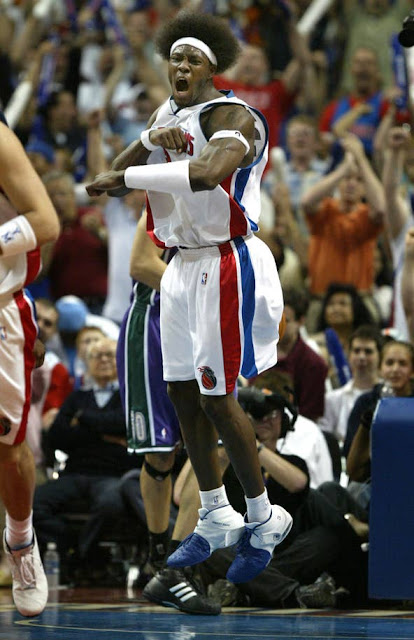

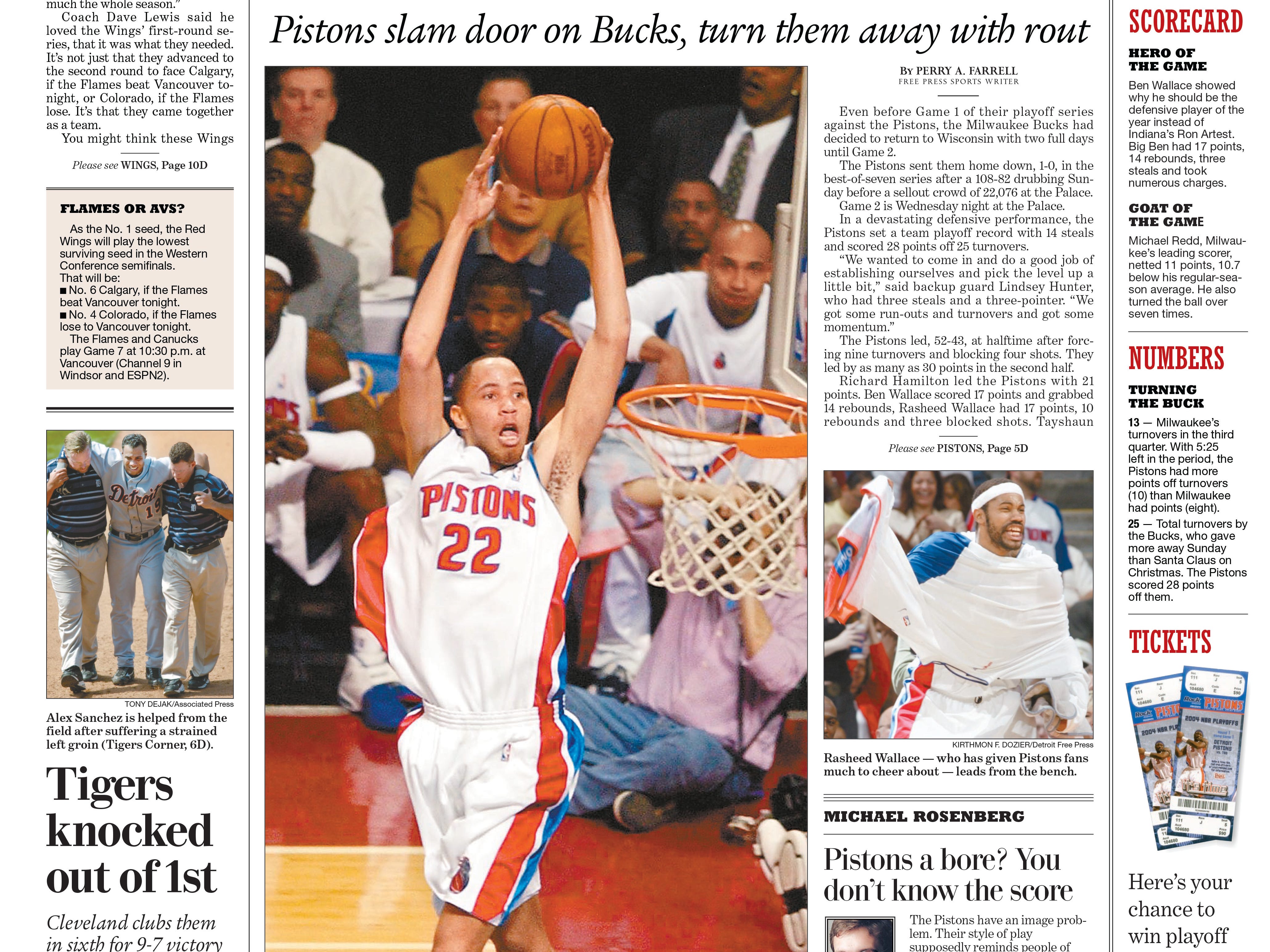


Commenti
Posta un commento